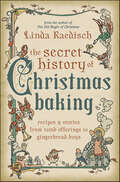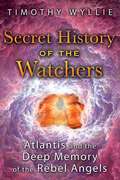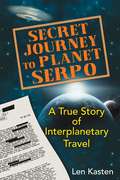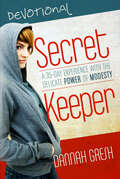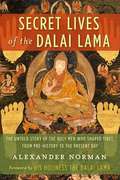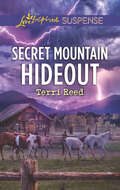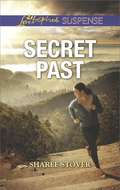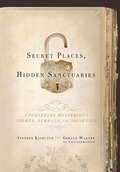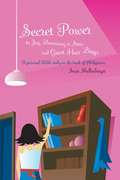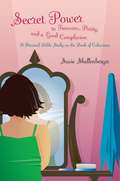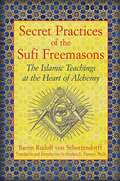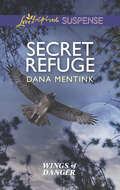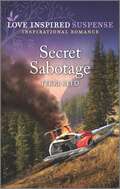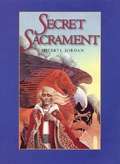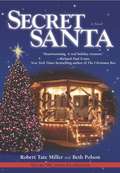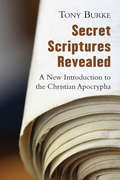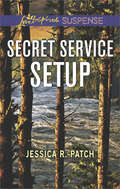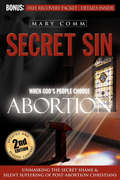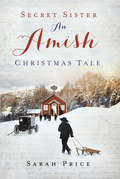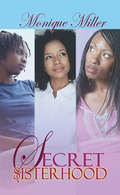- Table View
- List View
Secret History of Christmas Baking: Recipes & Stories from Tomb Offerings to Gingerbread Boys
by Linda RaedischExplore the Surprising and Sometimes Dark Origins of Beloved Holiday BakesSpice up your season by rolling, molding, and kneading your way through some of the world's most iconic Christmas recipes. Interspersed with tales of sailors, saints, tomb raiders, and artisans, The Secret History of Christmas Baking proves that even the humblest holiday treat has a global backstory.Did you know that the ancient Egyptians had their own version of gingerbread or that marzipan was once considered a pharmaceutical? Linda Raedisch dispels some long-standing culinary myths and delves into the darker chapters of the West's centuries-long romance with sugar and spices. In addition to more than forty recipes for modern bakers, you'll find illustrated instructions for dressing up your cakes and cookie plates with paper stars, angels, and witches. From Linzer tartlets to Christstollen, you can turn your kitchen into an Old World Christmas market stall.
Secret History of the Watchers: Atlantis and the Deep Memory of the Rebel Angels
by Timothy WyllieWriting together with Timothy Wyllie, the angel Georgia details the events of Earth’s ancient history in the 8th millennium BC • Reveals how Atlantis had copper mines in North America and tin mines in England, which initiated the Bronze Age and made Atlantis outrageously wealthy • Explains the true purpose of Gobekli Tepe as part of Prince Caligastia’s plan to enslave mortal souls • Interwoven with observations about Wyllie’s current and previous lives, such as his involvement with the Process Church and his profound near-death experience After Lucifer’s angelic rebellion 203,000 years ago, Earth and 36 other planets were quarantined from the larger Multiverse. Despite aligning with the rebel angels, Georgia--an angel of Seraphic status--was permitted to remain on Earth and continue her role as a Watcher. In this book, Georgia, writing together with Timothy Wyllie, shares her personal account of Earth in the 8th millennium BCE, the first era of Atlantis. Georgia shares her experiences being present as Atlantis was recovering from the first of three natural disasters that would ultimately destroy it. She reveals how the Atlanteans had become confident mariners, beginning to turn to piracy, and how Atlantean ships had reached the west coast of North America. The copper the Atlanteans mined in North America, together with tin from England, powered the Bronze Age and initiated the first truly technological civilization on Earth, making Atlantis outrageously wealthy. Georgia also shows how Gobekli Tepe was an attempt by Prince Caligastia to sabotage the planet’s electromagnetic energy grid and interfere with mortal ascension, all in order to enslave souls to an endless series of mortal incarnations. After Caligastia put this plan into action, Georgia found that 70 percent of Atlanteans were now rebel angel incarnates--the Multiverse Administration had thwarted his efforts to recycle souls. Interwoven with Georgia’s narrative of Earth’s ancient history are her observations of Timothy Wyllie’s current and previous lives, including his involvement with the Process Church and his profound near-death experience in 1973. Georgia shares her words, in part, to awaken the 100 million rebel angels currently living their human lives, most unaware of their angelic heritage. She reveals how a mortal incarnation for a rebel angel is an opportunity to redeem their past and help prepare the way for the imminent transformation of global consciousness as the rebel-held planets, including Earth, are welcomed back into the Multiverse.
Secret Journey to Planet Serpo: A True Story of Interplanetary Travel
by Len KastenDocuments how 12 people, as part of a top-secret U.S. government program, traveled to the planet Serpo and lived there for 13 years • Based on the debriefing of the Serpo team and the diary of the expedition’s commander • Explains how the aliens helped us reverse-engineer their antigravity spacecraft and develop technology to solve our planet-wide energy problems • Reveals how our government has an ongoing relationship with the Serpo aliens On July 16, 1965, a massive alien spacecraft from the Zeta Reticuli star system landed at the Nevada test site north of Las Vegas. Following a plan set in motion by President Kennedy in 1962, the alien visitors known as the Ebens welcomed 12 astronaut-trained military personnel aboard their craft for the 10-month journey to their home planet, Serpo, 39 light-years away. In November 2005, former and current members of the Defense Intelligence Agency--directed by Kennedy to organize the Serpo exchange program--came forward to reveal the operation, including details from the 3,000-page debriefing of the 7 members of the Serpo team who returned after 13 years on the planet. Working with the DIA originators of the Serpo project and the diary kept by the expedition’s commanding officer, Len Kasten chronicles the complete journey of these cosmic pioneers, including their remarkable stories of life on an alien planet, superluminal space travel, and advanced knowledge of alien technologies. He reveals how the Ebens presented the U.S. with “The Yellow Book”--a complete history of the universe recorded holographically, allowing the reader to view actual scenes from pre-history to the present. He explains how the Ebens helped us reverse-engineer their antigravity spacecraft and develop technology to solve our planet-wide energy problems--knowledge still classified. Exposing the truth of human-alien interaction and interplanetary travel, Kasten reveals not only that the Ebens have returned to Earth eight times but also that our government continues to have an ongoing relationship with them--a relationship with the potential to advance the human race into the future.
Secret Keeper Devotional: A 30-Day Experience with the Delicate Power of Modesty (Secret Keeper)
by Dannah GreshSecret Keeper Devos journal is a great follow-up study to the Secret Keeper book. It invites teenage girls to interact with biblical texts on modesty and God's view of true beauty. With blank pages for the reader's responses, this 30-day devotional will challenge girls to view themselves as masterpieces created by God.
Secret Keeper Devotional: A 30-Day Experience with the Delicate Power of Modesty (Secret Keeper)
by Dannah GreshSecret Keeper Devos journal is a great follow-up study to the Secret Keeper book. It invites teenage girls to interact with biblical texts on modesty and God's view of true beauty. With blank pages for the reader's responses, this 30-day devotional will challenge girls to view themselves as masterpieces created by God.
Secret Keeper: The Delicate Power of Modesty (Secret Keeper)
by Dannah GreshEVERY WOMAN IS BORN WITH POWER!We live in the age of low-rise jeans, belly-button rings, and backless shirts. Many girls and young women today could not even define the word modesty, let alone tell you how to live it out. Teen girls often ask: Why can't I wear what everyone else is wearing? My parents are hung up on their old sense of fashion. Times have changed, why can't I? Isn't is really the guy's problem if he is tempted?In a fresh and trusted voice, Dannah Gresh has a new message for them: modesty itself is a delicate yet formidable power. In Secret Keeper, she teaches that modesty not only issues a challenge for one man to romantically earn your virtue, but it also expresses your love for and obedience to God. Includes The "Truth or Bare" Fashion Tests and Fashion Challenges that will resonate with a teen girl.
Secret Keeper: The Delicate Power of Modesty (Secret Keeper)
by Dannah GreshEVERY WOMAN IS BORN WITH POWER!We live in the age of low-rise jeans, belly-button rings, and backless shirts. Many girls and young women today could not even define the word modesty, let alone tell you how to live it out. Teen girls often ask: Why can't I wear what everyone else is wearing? My parents are hung up on their old sense of fashion. Times have changed, why can't I? Isn't is really the guy's problem if he is tempted?In a fresh and trusted voice, Dannah Gresh has a new message for them: modesty itself is a delicate yet formidable power. In Secret Keeper, she teaches that modesty not only issues a challenge for one man to romantically earn your virtue, but it also expresses your love for and obedience to God. Includes The "Truth or Bare" Fashion Tests and Fashion Challenges that will resonate with a teen girl.
Secret Lives of the Dalai Lama
by Dalai Lama Alexander NormanThe Complete Story of the Dalai Lamas His Holiness the Fourteenth Dalai Lama is known to the world for his efforts to preserve Tibetan culture and for his inspiring spiritual teachings. Often unnoticed, however, is the long, colorful history from which this most beloved of holy men has emerged. In Secret Lives of the Dalai Lama, Alexander Norman tells this story in full for the first time, from Tibetan Buddhism's foundational narratives to the present-day crisis faced by Tibet. And what a story it is. Along with dedicated monks selflessly serving the Tibetan people, among His Holiness's spiritual forebears there are a Dalai Lama who waged wars, a womanizing and inebriated poet, and several who wound up dead following disputes over temporal power. Also, while Western practitioners focus on Tibetan Buddhism's liberating vision of enlightenment, it simultaneously contains ritual practices of prophecy and magic, as well as a vivid pantheon of deities and demons. In the end, although Tibet falls short of the Western myths of a Himalayan utopia, by illuminating the historical struggle toward compassion and selflessness embodied in the Dalai Lama lineage, Secret Lives of the Dalai Lama ultimately reveals a reality that is vastly more compelling than any romance of "Shangri-La" and provides deeper reasons for admiring Tibetan tradition.From the Trade Paperback edition.
Secret Mountain Hideout
by Terri ReedFrom the RITA and Carol Award finalist: Staying hidden in a remote Colorado town has kept her safe—until now . . .A remote Colorado mountain town and a fake identity have been Ashley Willis’s safe haven since she fled after witnessing a murder—but now the killer has found her trail. Desperate and terrified, she’s prepared to run again . . .But Deputy Sheriff Chase Fredrick won’t let her. With the lawman by her side, can she face danger head-on . . . and live long enough to bring a murderer to justice?
Secret Past: Faith in the Face of Crime
by Sharee StoverHer life is a lieShe’s not who she thinks she isWith gunmen at her doorstep, Katie Tribani learns her true identity. She’s been in witness protection since childhood, and now her crime-lord father has found her. As bullets fly, US marshal Daniel Knight whisks her to safety—but not for long. Captured and held prisoner, only Katie can unearth her secret past…if she can survive long enough.
Secret Places, Hidden Sanctuaries: Uncovering Mysterious Sights, Symbols, and Societies
by Gerald Warner Stephen Klimczuk“[A] brilliant new tome . . . If you like intrigue, hidden gems and historical treatments about all things ‘off limits’ this book will fascinate you.” —The American SpectatorThe doors of some of the world’s best-hidden places and most secretive organizations have now been thrown wide open! Some of the names are familiar: Area 51, Yale’s Skull and Bones, Opus Dei, the Esalen Institute. Others are more obscure, hidden by fate or purposeful deception, such as the Mount Weather Emergency Operations Center, the super-secure facility where Vice President Dick Cheney was secreted after the 9/11 attacks, and Germany’s Wewelsburg Castle, which was intended to become the mythological centerpiece of the Nazi Regime. Readers can take an unprecedented look deep inside the off-the-map military installations and shadowy organizations that operate in the murkiest corners of our world.“A great book . . . written with wit and style . . . Of course there are many other famous sites discussed as well, from the brooding castle which Himmler designed as the headquarters of the SS, to the shrine of the Oracle at Delphi, to Bollengin Tower on Lake Zurich, Switzerland, which Carl Jung built as a retreat for his study into psychology.” —The Scottish Rite of Freemasonry
Secret Power for Girls (Secret Power Bible Studies for Girls)
by Susie ShellenbergerThe signature book in an exciting new line of products designed for girls ages 11-16 Using contemporary language, illustrations, design, and graphics, this book confronts the problems of identity, security, and self-esteem that plague young teenage women today. Through a skillful examination of the Scriptures it reveals the power for daily living that God has promised to believers and shows readers that the world has nothing compared to what God offers. Topics include Self-Esteem, Power of the World, Power of the Underworld, the Holy Spirit, and Truth
Secret Power to Joy, Becoming a Star, and Great Hair Days
by Susie ShellenbergerIt sounds like the headline from a teen magazine! I mean, why would God care about how you feel about your hair? Well, he doesn’t necessarily care about your hair, but he cares a lot about how you feel and act. If you get into what God says in the Bible, you can learn to be like a star and feel like every day is the best hair day of your life. Secret Power to Joy, Becoming a Star, and Great Hair Days is a Bible study in the book of Philippians. Don’t worry, it’s not like school. You can do as much or as little at a time as you want, and you can do the study with a friend. You don’t even need a Bible (all the verses are included). The best part is that reading this book will change your life in big ways. You’ll learn to be content regardless of what’s going on around you, and you’ll learn how God can help you stay focused on the most important thing: Him. So, if you’re ready to start feeling better about your life, regardless of what your hair has in mind, grab this book and discover your secret power to joy.
Secret Power to Treasures, Purity, and a Good Complexion
by Susie ShellenbergerSecret Power to Treasures, Purity, and a Good Complexion is a look at the book of Colossians that will help you discern what it means to be a Christian. This book can help you sort out all the stuff you hear about other beliefs and figure out what does and doesn’t fit with being a follower of Christ. And don’t worry—this isn’t at all like reading a book for school. It’s more like a map for an adventure. Check it out a little at a time, or a lot; look at it alone, with a friend … or with a bunch of friends. If you take the time to get through this book, you will: • Discover treasures you never knew about • Find goodness you didn’t know you had • Tap into the secret power that will change your life
Secret Power to Winning, Happiness, and a Cool Wardrobe
by Susie ShellenbergerA Personal Bible Study on the Book of 1 Peter Everyone wants to win, be happy, and, whenever possible, wear cool clothes in the process. And why not? That’s what life and success are all about, right? Think again. The kind of success and wardrobe that author Susie Shellenberger writes about has nothing to do with money or buying power at the mall. It comes from God and from knowing who you are in God’s eyes. With this interactive study of 1 Peter, you and your friends get a chance to examine God’s ideas about what it means to be happy and successful. With true-to-life stories and practical tips, discover a secret power that’s yours for the taking—because Christ has already won it for us. We just need to follow his lead.
Secret Practices of the Sufi Freemasons: The Islamic Teachings at the Heart of Alchemy
by Stephen E. Flowers Baron Rudolf von SebottendorffReveals the secret spiritual exercises of the Bektashi Order of Sufis • Shows how this order, also known as Oriental Freemasonry, preserves the ancient spiritual doctrines forgotten by modern Freemasonry • Explains how to transform the soul into the alchemical Magnum Opus by combining Masonic grips and the abbreviated letters of the Qur’an • Includes a detailed biography of Baron von Sebottendorff Originally published in Germany in 1924, this rare book by Baron Rudolf von Sebottendorff reveals the secret spiritual exercises of the Bektashi Order of Sufis as well as how this order, also known as Oriental Freemasonry, preserves the ancient spiritual doctrines forgotten by modern Freemasonry. Sebottendorff explains how the mysterious abbreviated letters found in the Qur’an represent formulas for perfecting the spirit of the individual. When combined with Masonic hand signs and grips and conducted accordingly to a precise schedule, these formulas incorporate spiritual power into the body and transform the soul from its base state into a noble, godlike state: the Magnum Opus of the medieval alchemists. Laying out the complete program of spiritual exercises, Sebottendorff explains each abbreviated word-formula in the Qur’an, the hand gestures that go with them, and the exact order and duration for each exercise. Including a detailed biography of Sebottendorff and an examination of alchemy’s Islamic heritage, this book shows how the traditions of Oriental Freemasonry can ennoble the self and lead to higher knowledge.
Secret Refuge: Secret Refuge Royal Rescue Fatal Freeze (Wings of Danger #2)
by Dana MentinkHIS CHANCE AT REDEMPTION Former parole officer Mick Hudson blames himself for the death of Keeley Stevens's sister. If he hadn't paroled a criminal, she might still be alive. When he hears that the suspected killer has been spotted in Keeley's hometown, he worries she might be the next victim. Keeley doesn't want to take help from the man who could have prevented her sister's death, but she has more than herself to worry about. She'll do anything it takes to protect her family. And Mick will risk his life to make sure that the past does not repeat itself. Wings of Danger: The path to love is treacherous
Secret Sabotage
by Terri ReedThe crash was intentional… But he can&’t remember why. With no memory of the crash that landed him in a hospital, Ian Delaney is determined to uncover who sabotaged his helicopter—without the protection of his family-appointed bodyguard. But Simone Walker&’s used to stubborn clients and won&’t let Ian leave her sight. To catch an unknown traitor, they must rely on each other…or the next attack could prove lethal.From Love Inspired Suspense: Courage. Danger. Faith.
Secret Sacrament
by Sherryl JordanFrom the book jacket: Ages 12 up DREAMS. VOWS. PROPHECIES. DESTINY. The Navoran Empire is wealthy, powerful--and slowly falling under the sway of the Empress's corrupt and sinister adviser. The Shinali nation has been reduced to a single clan on a small strip of land. They cling to their traditional ways, awaiting a hero out of legend. All Gabriel Eshban Vala has ever wanted is to be a healer. It has been this way since his seventh year, when he witnessed a brutal act he was helpless to stop. But he never forgot the eyes of the dying Shinali woman who asked him for help. From that day forward, Gabriel withstood the demands of his father, his family, and even his Empress in order to pursue his dreams of healing the sick. So what could an ancient prophecy foretelling his powerful nation's downfall have to do with him? When a chance meeting on a lonely plain brings him into the land of the Shinali, Gabriel develops a deep respect for these people and grows more and more disenchanted with his place among the powerful rulers of the Navoran Empire. Now, caught between loyalty to his Navoran roots and love for the Shinali people, Gabriel must make a single choice. The fate of two nations hangs in the balance. And so does Gabriel's own life. Sherryl Jordan has written an extraordinary and deeply moving tale of fate, hope, loyalty--and the ability of one man to change destiny.
Secret Santa
by Robert Tate Miller Beth PolsonIt's Christmas, and Indianapolis Sentinel reporter Rebecca Chandler has just been dumped by her boyfriend. Tired of covering the usual seasonal fluff -- and in no mood for warmth and sincerity -- she reluctantly accepts her editor's assignment to travel to nearby Hamden and cover the story of Secret Santa, a benevolent stranger who appears mysteriously every Christmas Eve to bestow a generous gift on someone less fortunate. But Rebecca has ideas of her own. Instead of the life affirming tearjerker her editor wants, she intends to write a hard-edged investigative piece unmasking the good samaritan. "After I'm done with him, he'll be known as the bleeding heart do-gooder, formerly known as Secret Santa. "That's what she thinks. Rebecca didn't count on Hamden, Indiana, a town that claims to live the Christmas spirit all year long. Small-town USA, complete with a main street diner and an Annual Christmas Pageant, Hamden is home to a cast of quirky characters, a handsome millionaire. . . and the most unlikely Secret Santa of them all. Determined to uncover the identity of the holiday philanthropist, Rebecca quickly learns that things are not always as they appear, and in the process of looking for Santa, Rebecca finds love, the honor of sacrifice. . . and the true meaning of Christmas. Giving in its purest formexpects nothing in return.
Secret Scriptures Revealed: A New Introduction to the Christian Apocrypha
by Tony BurkeThe Christian Apocrypha burst into the public consciousness in 2003, following the publication of The Da Vinci Code by Dan Brown. Interest in the wide assortment of texts not included in the Bible has remained strong ever since. Although much has been written and said on the subject, misunderstandings still abound. Tony Burke's Secret Scriptures Revealed dismantles the many myths and misconceptions about the Christian Apocrypha and straightforwardly answers common questions like these:Where did the apocryphal texts come from and who wrote them?Why were they not included in the Bible?Is reading these texts harmful to personal faith? The book describes and explains numerous fascinating apocryphal stories, including many that are not well known. Instead of dismissing or smearing the Christian Apocrypha, Burke shows how these texts can help us better understand early Christian communities and the canonical Bible.
Secret Service Setup: Night Stalker Treacherous Trails Secret Service Setup (The Security Specialists #2)
by Jessica R. PatchA federal agent in the crosshairs must turn to his ex for help—but will he wind up putting her in harm’s way?Secret Service agent Evan Novak becomes the target of multiple hit men when someone puts a two-million-dollar bounty on his head. Is it the gunrunner he’s tracking . . . or a traitorous agent?Framed and wanted, Evan reluctantly accepts protection from bodyguard Jody Gallagher, his former love, who lost her Agency career because of him. But then the bounty is raised to include Jody . . .
Secret Sin: When God's People Choose Abortion (Morgan James Faith Ser.)
by Mary CommSecret Sin: When God's People Choose Abortion was written because abortion is one of the last great secret sins that remains "in the closet." And because the Church hasn't been aware of the magnitude of this secret sin or how it affects those it touches, the Church has done little or nothing to help these people suffering silently in their midst to find healing in Christ. This book was written to pull back the curtain giving those within the Church an inside look into the world of the post-abortive Christian with the intent of spurring them on to begin reaching out to these hurting people with the compassion of Christ.
Secret Sister: An Amish Christmas Tale
by Sarah PriceAfter years of giving of herself to her family and community, Grace Beiler, an elderly Amish woman, is facing her first Christmas since losing her husband of fifty years to his battle with cancer. As she begins to reflect upon her own life, she wonders if she has properly fulfilled her promise to be a servant of God. With Christmas drawing near, her depression becomes stronger until she starts receiving little gifts in the mail and left on her doorstep. She realizes that she has a &“secret sister,&” but has no idea who it might be, for each gift seems to relate to different, important events in her life. Just when she thinks she might have figured out who the secret sister is, a new gift arrives with a different meaning. Who is making this Christmas one Grace will never forget?
Secret Sisterhood
by Eve Silver Monique MillerSecret Sisterhood focuses on the lives of three women who share one painful truth: they can't have the children they so desperately desire.Shelby Tomlinson works as a registered nurse in an infertility clinic, which makes it even more difficult to deal with her own inability to conceive a child. Her husband, Phillip, avoids the subject like the plague, and Shelby feels she has no one she can confide in. When she starts experiencing anxiety attacks, Shelby turns to God, praying for guidance. She hopes it's true what they say, that He will not give her more than she can bear.Crystal Shaw has two dreams: to open her own daycare center, and to have a child of her own. While one of her dreams is about to come true, the other one has to be deferred indefinitely. Now Crystal endures a daily test as she works in a daycare center, caring for other people's children. She often finds herself judging people and wondering why God would bless them with children and not her. Will Crystal learn how to trust God in all the areas of her life, even when things seem at their worst?Vivian Parker appears to have it all. She's living the life she's been planning ever since she was thirteen, right down to the perfect rich husband. The only thing missing from her original plan is a baby. She and her husband kept pushing back the date to start a family, and now it might be too late. Now she is forced to re-evaluate everything, including her faith in God.
